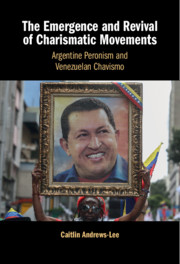Crossref Citations
This Book has been
cited by the following publications. This list is generated based on data provided by Crossref.
Andrews-Lee, Caitlin
and
Gamboa, Laura
2022.
When handpicked successors of charismatic leaders prosper: the surprising success of Juan Manuel Santos in Colombia.
Democratization,
Vol. 29,
Issue. 6,
p.
1116.
Boersner Herrera, Adriana
and
Haluani, Makram
2023.
Domestic and international factors of the contemporary Russo–Venezuelan bilateral relationship.
Latin American Policy,
Vol. 14,
Issue. 3,
p.
366.
Metz, Rudolf
and
Plesz, Bendegúz
2023.
An insatiable hunger for charisma? A follower-centric analysis of populism and charismatic leadership.
Leadership,
Vol. 19,
Issue. 4,
p.
318.
Brunkert, Lennart
and
von Soest, Christian
2023.
Praising the leader: personalist legitimation strategies and the deterioration of executive constraints.
Democratization,
Vol. 30,
Issue. 3,
p.
419.
Baturo, Alexander
Kenny, Paul D.
and
Balta, Evren
2024.
Leaders’ experience and the transition from populism to dictatorship.
Democratization,
p.
1.
Luján, Diego
and
Acosta y Lara, Federico
2024.
Assessing Electoral Personalism in Latin American Presidential Elections.
Journal of Politics in Latin America,
Vol. 16,
Issue. 3,
p.
275.
Márquez, Xavier
2024.
The mechanisms of personalization.
Democratization,
p.
1.
Resmini, Fabio
and
Abbott, Jared
2024.
What is to be Done? How Radical Leftists Help to Solve the Problem of Personalist Party-Building in Latin America.
Comparative Political Studies,
Vol. 57,
Issue. 10,
p.
1634.
Regal, Britt
Ferlie, Ewan
Aagaard, Peter
and
Vrbek, Sanja
2024.
Governance modes, mayoral leadership and transitions to public sector co-creation across Europe.
Public Policy and Administration,
Sánchez Sierra, Juan Carlos
and
Vergaray, Alfonso R.
2024.
The Personalist Leadership Style of Fabio Vásquez: A Case Study on the Origins of the ELN.
Societies,
Vol. 14,
Issue. 9,
p.
188.
Weyland, Kurt
2024.
Charivari 2.0: The Striking Resurgence of an Old Contentious Tactic.
Perspectives on Politics,
p.
1.
Luján, Diego
and
Puig Lombardi, Gonzalo
2024.
El encanto del personalismo: explicando el ascenso de Nayib Bukele en El Salvador.
América Latina Hoy ,
Vol. 94,
Issue. ,
p.
e31891.
de la Cerda, Nicolás
Hartlyn, Jonathan
and
Martinez-Gallardo, Cecilia
2024.
Ideological and Populist Bases of Partisan Responses to the COVID-19 Pandemic in Latin America.
Journal of Politics in Latin America,
Vol. 16,
Issue. 2,
p.
252.
Metz, Rudolf
and
Plesz, Bendegúz
2025.
The Irresistible Allure of Charismatic Leaders? Populism, Social Identity, and Polarisation.
Politics and Governance,
Vol. 13,
Issue. ,



